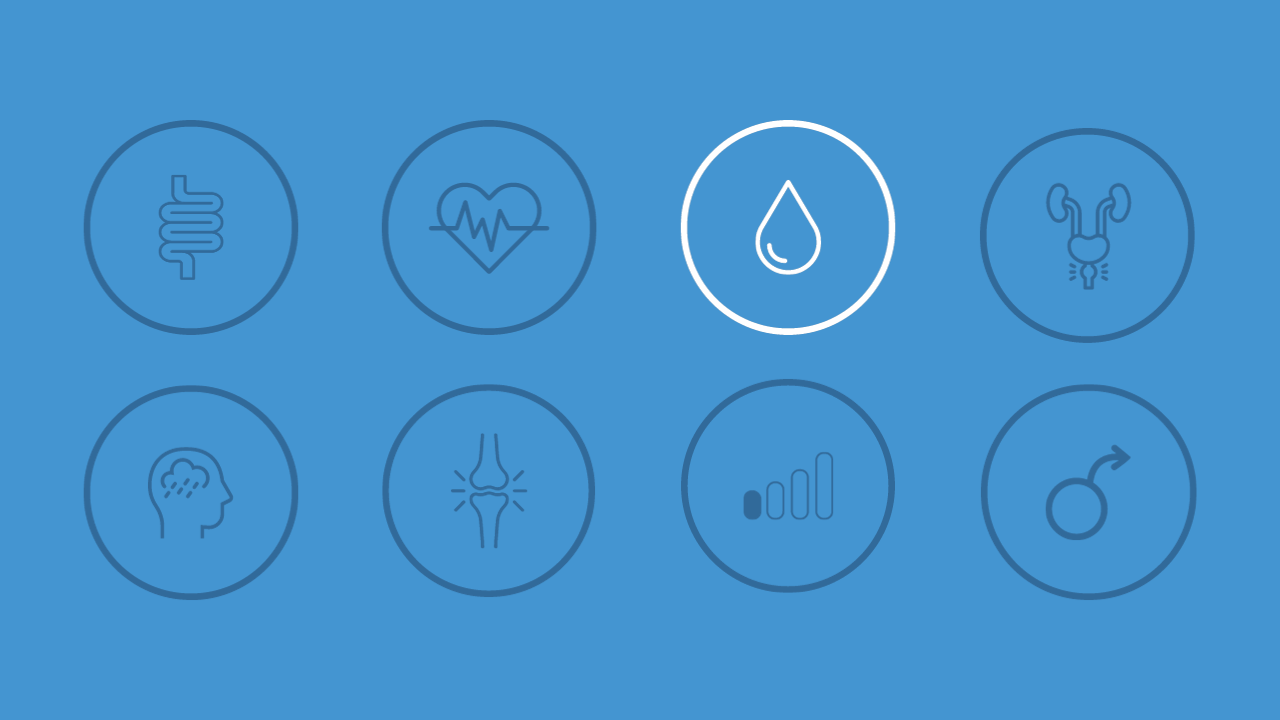Approximately 35-45% of men with diabetes are affected by erectile dysfunction.
Diabetes Canada
What is Type 2 Diabetes?
Type 2 diabetes is a disease where your body cannot make enough insulin or properly use the insulin it does make, leading to higher blood sugar levels. Insulin is a hormone that helps control the amount of sugar in your blood. Type 2 diabetes is most commonly developed in adulthood caused by certain risk or lifestyle factors.
When left untreated, type 2 diabetes can have many serious complications such as heart disease and stroke, blindness, and kidney failure. Type 2 diabetes differs from type 1 diabetes—an autoimmune disease in which people aren’t able to produce insulin.
What is prediabetes?
Prediabetes occurs when blood sugar levels are higher than normal, but not high enough to be diagnosed as type 2 diabetes. When unmanaged, prediabetes can progress to type 2 diabetes.
Signs & Symptoms
These are the most common signs and symptoms of type 2 diabetes. Some people may experience no symptoms at all, especially when diagnosed early.
- Unusual thirst
- Frequent urination
- Weight change (gain or loss)
- Extreme fatigue or lack of energy
- Blurred vision
- Frequent or recurring infections
- Cuts and bruises slow to heal
- Tingling or numbness of hands/feet
- Trouble with getting or maintaining an erection
- Diabetes ketoacidosis (DKA)
Low testosterone is also common in men with type 2 diabetes. Symptoms of low testosterone can include: diminished interest in sex, erectile dysfunction, reduced lean body mass, depressed mood and lack of energy.
If you think you or someone you know may have type 2 diabetes, consult with a healthcare practitioner. If left unmanaged, type 2 diabetes can lead to serious complications.
Risk Factors
Some risk factors for type 2 diabetes are out of our control, like ethnic background, and some can be managed through lifestyle changes, like diet and exercise.
Common risk factors:
- Being over the age of 40
- Immediate family member with diabetes
- High BMI or being overweight (especially around the midsection)
- Prediabetes
- Ethnic background of African, Arab, Asian, Hispanic, Indigenous, or South Asian descent
- High blood pressure
- High levels of cholesterol/fats in blood
- Psychiatric disorders (schizophrenia, depression, bipolar disorder)
- Obstructive sleep apnea
- Darkened patches of skin called acanthosis nigricans
Know Your Health Risk
In 10 minutes, learn your risk level for the 8 most common health conditions affecting Canadian men. Men’s Health Check is free, anonymous and backed by medical experts.

Screening
Adult men are more at risk of type 2 diabetes compared to adult women
Diabetes Canada
Many people who have type 2 diabetes have no symptoms, therefore regular screening is important.
Screening for type 2 diabetes or prediabetes is done through a blood test. Anyone over the age of 40 should be tested every three years. If you have one or more risk factors, you should be tested earlier and more frequently. While there is no cure for type 2 diabetes, the ability to treat it into remission is more likely in the earlier stages of the disease.
Download the Men’s Health Checklist for a full list of what tests you need, and when to screen for common men’s health conditions.
Diagnosis
Type 2 diabetes is diagnosed by a healthcare practitioner through your medical history, physical examination, and a blood test that measures the amount of sugar in your blood.
Prevention
While some risk factors for type 2 diabetes are out of your control, others can be managed through healthy lifestyle choices.
Get Active
Regular physical activity can help prevent type 2 diabetes. Even small amounts of activity can be beneficial. Start with sitting less, moving more, and work up to 150 minutes of heart-pumping activity per week.
If you have prediabetes, losing just 5-10% of your initial body weight through diet and exercise can delay or prevent type 2 diabetes.
Eat Healthier
Being overweight or obese increases your risk of developing type 2 diabetes. A healthy diet and exercise can help you reach or maintain a healthy weight while also controlling your blood glucose levels.
A healthy diet includes lowering your intake of highly processed foods like cakes and pastries, and adding more vegetables, lean proteins, healthy fats, dairy and whole grains. Seek the advice of a registered dietitian for a personalized nutrition plan that can work for you.
Get Easy Tips To Reduce Your Risk
Treatment
While there is no cure for type 2 diabetes, you can live a long and healthy life by keeping your blood sugar levels in the target range set by you and your healthcare practitioner.
A blood glucose meter is used to monitor blood sugar levels at home. Some people will require medication, and others can regulate blood sugar levels through weight control, healthy eating and activity.
Improving lifestyle factors like diet and exercise can sometimes cause type 2 diabetes to go into remission. This is most likely to occur in the early stages of the disease or with extensive weight loss.
Frequently Asked Questions
A Guy’s Guide to Eating Healthy
Make healthy eating easier with simple dietitian tips, food facts and recipes made for men.

proudly sponsored by:

Sources :
Last updated: Oct 5, 2023
Disclaimer: This resource is intended for informational and educational purposes only. It is not intended to provide diagnosis or be a substitute for professional medical advice from a healthcare practitioner. You should not use the information provided for diagnosing or treating a medical or health condition. If you have or suspect you have a medical or health problem, promptly consult your healthcare practitioner.




